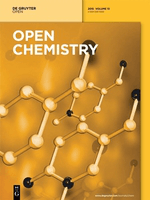
Open Chemistry
Scope & Guideline
Catalyzing Progress in Chemistry and Materials Science
Introduction
Aims and Scopes
- Medicinal Chemistry and Drug Development:
The journal emphasizes research on the design, synthesis, and evaluation of new pharmaceutical compounds, including studies on their biological activities, molecular interactions, and potential therapeutic applications. - Nanotechnology and Materials Science:
There is a strong focus on the development and characterization of nanomaterials, particularly their synthesis via green methods, their applications in drug delivery, catalysis, and environmental remediation. - Biochemistry and Molecular Biology:
Research in this area includes investigations into the biochemical pathways and mechanisms of action of various compounds, as well as their implications for health, disease prevention, and treatment. - Environmental Chemistry:
The journal covers studies on the chemical composition and contamination of environmental samples, as well as the development of methods for pollution remediation and sustainability. - Analytical Chemistry:
Open Chemistry features advancements in analytical techniques, including novel methods for the detection and quantification of chemical compounds in various matrices.
Trending and Emerging
- Green Chemistry and Sustainable Practices:
There is a growing trend towards research that emphasizes environmentally friendly synthesis methods, particularly the use of biological materials and processes for the development of chemical products. - Computational Chemistry and Molecular Modeling:
The use of computational methods for drug design, molecular docking, and toxicity prediction is increasingly prevalent, reflecting a trend towards integrating computational approaches with experimental research. - Phytochemistry and Natural Products:
Research involving the extraction, characterization, and biological evaluation of compounds from plants is on the rise, showcasing the potential of natural products in drug discovery and development. - Nanomedicine and Targeted Therapies:
Studies focusing on the application of nanotechnology in medicine, particularly in targeted drug delivery systems, are gaining traction as researchers explore innovative solutions for disease treatment. - Antimicrobial Resistance Studies:
With the increasing concern over antimicrobial resistance, research addressing the development of new antimicrobial agents and strategies to combat resistant pathogens is becoming a prominent theme.
Declining or Waning
- Traditional Organic Synthesis:
Research focused solely on traditional organic synthesis methods has decreased as the field moves towards greener, more sustainable approaches that integrate nanotechnology and biocatalysis. - Inorganic Chemistry without Biological Relevance:
There has been a noticeable reduction in inorganic chemistry studies that do not address biological implications or applications, as the journal increasingly emphasizes interdisciplinary research. - Basic Physical Chemistry Studies:
Papers focused exclusively on fundamental physical chemistry principles without practical applications are becoming less common, as the journal favors studies with direct implications for real-world challenges.
Similar Journals

REVUE ROUMAINE DE CHIMIE
Catalyzing Innovation in the Realm of ChemistryREVUE ROUMAINE DE CHIMIE is a distinguished academic journal in the field of chemistry, published by EDITURA ACAD ROMANE in Romania. With an ISSN of 0035-3930, this journal has been a valuable platform for disseminating original research and insights in the diverse realm of chemistry since its inception. The journal currently operates under a competitive tier, categorized in Q4 for miscellaneous chemistry fields, as reflected in its Scopus ranking of #348 out of 408, placing it within the 14th percentile. Aiming to foster scientific discourse and innovation, the REVUE ROUMAINE DE CHIMIE provides a repository of knowledge that is crucial for researchers, professionals, and students eager to advance their understanding and contribute to the global chemistry community. By bridging local and international research initiatives, this journal plays an essential role in enhancing the visibility of Romanian scientific contributions on the world stage.
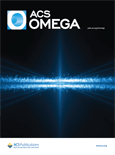
ACS Omega
Innovative Insights, Accessible to All.ACS Omega is a prominent open-access journal published by the American Chemical Society that has been serving the global research community since its inception in 2016. With ISSN 2470-1343, it focuses on a wide array of topics within the realm of Chemistry and Chemical Engineering, making it a crucial platform for researchers and practitioners aiming to disseminate significant findings across these disciplines. The journal maintains an impressive standing, ranking in the Q2 quartile for both Chemical Engineering and Chemistry categories, highlighting its impact and relevance in contemporary research. Additionally, with its Scopus ranks placing it within the top 24% and 27% of General Chemistry and General Chemical Engineering respectively, ACS Omega continues to foster innovation and facilitate collaboration among scientists. As an Open Access journal, it ensures that research outputs are freely available to all, enhancing the accessibility and visibility of contributors’ work, thus playing a critical role in advancing scientific knowledge globally from its headquarters in Washington, D.C.
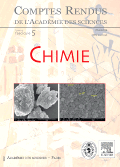
COMPTES RENDUS CHIMIE
Empowering Scientists with Open Access to Essential Knowledge.COMPTES RENDUS CHIMIE, published by the prestigious Académie des Sciences in France, stands as a significant journal in the fields of chemistry and chemical engineering. With an ISSN of 1631-0748 and an E-ISSN of 1878-1543, this open-access journal has been committed to disseminating high-quality research since its transition to open access in 2020. Featuring a diverse array of studies, the journal covers innovative research trends and applications, while maintaining a Q3 category ranking in both Chemical Engineering (miscellaneous) and Chemistry (miscellaneous) as of 2023. Its Scopus rankings, positioning at #251 out of 408 in general chemistry and #169 out of 273 in general chemical engineering, highlight its growing impact within the scientific community. Authored by a global cohort of scientists and researchers, COMPTES RENDUS CHIMIE is dedicated to the advancement of knowledge and sharing insights that are vital for ongoing research and development in the chemical sciences. Located in the heart of Paris at 23 Quai de Conti, 75006, France, the journal is an essential resource for those passionate about chemistry and engineering disciplines, fostering collaboration and innovation across the world.

Chemija
Advancing Research in Chemistry for a Brighter Tomorrow.Chemija is a prominent journal in the field of chemistry, published by LIETUVOS MOKSLU AKAD LEIDYKLA in Lithuania. With a focus on diverse topics within the realm of chemistry, this journal aims to disseminate original research articles, reviews, and discussions that advance the understanding and application of chemical science. Although it currently holds a Q4 ranking in the miscellaneous category of chemistry, Chemija is committed to elevating its impact through the publication of high-quality research, making significant contributions to the discipline. The journal operates under a non-open access model, ensuring that articles undergo rigorous peer review to uphold academic standards. Researchers, professionals, and students are encouraged to explore the wealth of knowledge within its pages as it endeavors to bridge gaps across various subfields of chemistry from 2008 to 2024. With a dedicated readership and a growing database of insightful publications, Chemija serves as an essential resource in the ever-evolving landscape of chemical research.
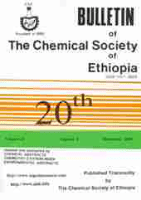
BULLETIN OF THE CHEMICAL SOCIETY OF ETHIOPIA
Driving Knowledge Forward in the World of ChemistryBULLETIN OF THE CHEMICAL SOCIETY OF ETHIOPIA (ISSN: 1011-3924; E-ISSN: 1726-801X), published by the Chemical Society of Ethiopia, serves as a pivotal platform for the dissemination of innovative research and developments within the field of chemistry. Since its inception in 1996 and now an open access journal since 2012, it has provided researchers, academics, and students with unrestricted access to critical studies and findings, thus fostering collaboration and the advancement of knowledge in the discipline. The journal's current standing in the Q3 quartile in the 2023 Chemistry category underlines its commitment to maintaining high academic standards, while its Scopus ranking, positioned at #250 out of 408 in general chemistry, showcases its growing influence and contribution to the scientific community. Hailing from Ethiopia and targeted toward a global readership, the journal aims to highlight local and international research, engaging scholars and practitioners alike in discussions that propel the science of chemistry forward.

CHEMICAL PAPERS
Bridging Theory and Application in Chemical EngineeringChemical Papers is a distinguished scientific journal published by Springer International Publishing AG, catering to the fields of Biochemistry, Chemical Engineering, and Materials Chemistry. With an ISSN of 0366-6352 and an E-ISSN of 2585-7290, this journal has been a pivotal platform for the dissemination of research findings since its inception in 1973. Over the years, it has maintained a strong academic presence, as evidenced by its Q2 and Q3 rankings in several pertinent categories as of 2023, including Chemical Engineering and Industrial and Manufacturing Engineering. Although the journal is not currently Open Access, it remains an invaluable resource for researchers and professionals across its scope, promoting the advancement of knowledge in chemical sciences and fostering innovation within the industry. The publication is headquartered in Cham, Switzerland, contributing to a global dialogue on chemical research and its applications.
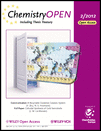
ChemistryOpen
Advancing Chemistry for AllChemistryOpen is a leading open access journal published by WILEY-V C H VERLAG GMBH, dedicated to advancing the field of chemistry. With its ISSN 2191-1363, this journal has been a vital platform since its inception in 2012, promoting unrestricted access to innovative research findings and critical reviews in various chemistry domains. As a testament to its growing influence, ChemistryOpen has achieved a commendable Q2 quartile ranking in the 2023 Chemistry (miscellaneous) category, which highlights its quality and impact within the academic community. Researchers, professionals, and students benefit from the journal's commitment to making high-quality research accessible, facilitating knowledge transfer and collaborative insights among chemists worldwide. The journal's transparent open access model ensures that groundbreaking discoveries and methodologies are readily disseminated, fostering a culture of innovation and interdisciplinary dialogue in the ever-evolving landscape of chemistry.

Moroccan Journal of Chemistry
Bridging Local Insights with Global Chemistry Research.Moroccan Journal of Chemistry, published by the University Mohammed Premier Oujda, serves as a pivotal platform for researchers and professionals in the field of chemistry, particularly focusing on diverse and emerging areas within the discipline. Established in 2018, this open-access journal facilitates widespread dissemination of scholarly articles, ensuring that cutting-edge research reaches a global audience. With an ISSN of 2351-812X and categorized in the Q3 quartile for miscellaneous chemistry in 2023, the journal maintains rigorous peer-review standards while fostering an inclusive environment for scientific dialogue. Located in Morocco, it aims to bridge local and international research communities, contributing to the advancement of knowledge in chemistry. As it continues to grow, the Moroccan Journal of Chemistry remains an essential resource for students, educators, and professionals eager to stay abreast of the latest developments in the field.
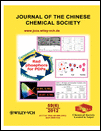
JOURNAL OF THE CHINESE CHEMICAL SOCIETY
Enriching the Global Dialogue in ChemistryJOURNAL OF THE CHINESE CHEMICAL SOCIETY, published by WILEY-V C H VERLAG GMBH, is a vital resource in the field of chemistry, focusing on a broad array of topics pertinent to general chemistry and its advancing sub-disciplines. Established in 1954 and running through 2024, this journal serves as a significant platform for the dissemination of high-quality research, showcasing innovative findings and developments within the chemical sciences. With its Q3 category ranking and positioning at Rank #203 in General Chemistry per Scopus, it reflects the journal's commitment to research excellence and impact. While not an open-access publication, it ensures accessibility to a global audience, making it an essential tool for researchers, professionals, and students alike seeking to stay informed and engaged in the evolving landscape of chemistry.

Results in Chemistry
Fostering Collaboration in Chemistry Across BordersResults in Chemistry is a prominent journal published by Elsevier, dedicated to fostering innovation and disseminating cutting-edge research in the field of chemistry. With an ISSN of 2211-7156, this open-access journal has been committed to making scientific knowledge widely available since 2019, aligning with the global trend towards accessibility in research. Based in the Netherlands, it features interdisciplinary studies that span the breadth of general chemistry, contributing significantly to the academic dialogue within the scientific community. Despite currently holding a Q3 ranking in the miscellaneous category of chemistry and occupying the 228th position out of 408 in Scopus rankings, the journal is poised for growth, aiming to enhance its impact and visibility. Researchers, professionals, and students alike will find invaluable resources and insights within its pages, making Results in Chemistry an essential platform for those looking to stay abreast of advancements and trends in chemistry research up to the year 2024.